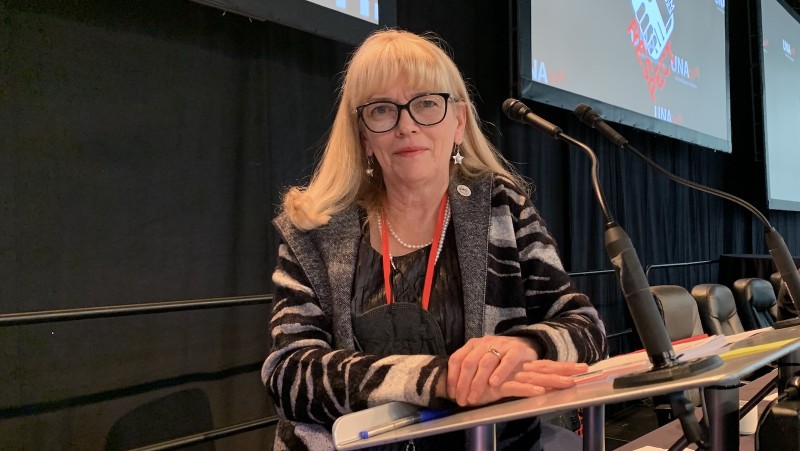Alberta must treat nurses and other health care workers with respect, says UNA President Heather Smith
Alberta’s government and health care employers need to understand that when the worldwide supply of nurses is tight and demand for nurses’ skills is high everywhere, the market “is certain to be impacted in ways that benefit members of the nursing profession,” United Nurses of Alberta President Heather Smith told the union’s annual general meeting today.
Solving Alberta’s nurse shortage “is going to require treating nurses and other health care workers with respect,” she told the approximately 950 Registered Nurses, Registered Psychiatric Nurses, staff and observers at the Edmonton EXPO Centre.
“You can’t recruit and retain nurses – which the government admits it needs to do, and says it wants to do – without treating nurses with respect, and to be blunt, that’s going to cost money,” she said to applause.
With formal bargaining set to commence in 2024 for a new collective agreement between United Nurses of Alberta and Alberta Health Services and other major health care employers, the focus on negotiations among UNA’s more than 30,000 members is intense, she said.
“I have never seen more interest among UNA’s members about what our demands should be in bargaining,” she said. “There was twice the number of proposals we received in 2019!”
The number of Professional Responsibility concerns and Occupational Health and Safety reports filed by UNA members is also high, she noted. “This is an indicator above all of just how desperate Alberta’s nurses are to help protect their patients and insure the safety of the facilities in which they work.”
“Members are not just concerned, they’re angry too,” Smith added. “Our employers, and our government, need to be paying attention at a time when health authorities in other provinces are recruiting aggressively.”
In her wide-ranging report to the AGM, Smith also touched on the Alberta government’s still secret plan to decentralize Alberta Health Services, its scheme to separate from the Canada Pension Plan and replace it with an Alberta pension, its continuing interest in privatizing public health care services, the impact of its plan to send internationally educated nurses (IENs) to remote and rural parts of the province, and the successful Rural Capacity Investment Fund negotiated in UNA’s last round of bargaining.
One of the next challenges nurses will face is the government’s plan to decentralize AHS, she said. But while Health Minister Adriana LaGrange has told media she has cabinet’s support her restructuring proposal, “she hasn’t told us what the proposal is.”
“Whatever it is, at a time like this when what the health care system needs is above all else stability, it’s not likely to be good news,” Smith stated.
“As we struggled through COVID-19, facing exhaustion, uncertainty and fear in our workplaces – not to mention the threatening behaviour of many of our fellow Albertans who had been convinced COVID was a conspiracy, not a disease – we had hoped for a reprieve, a respite, when the worst of the pandemic had passed,” she said. “But, sadly, one crisis has been replaced with another, and it appears to be getting worse.”
To loud applause, she called for the government to back away from its “terrible notion” of pulling out of the Canada Pension Plan.
“One of the things unions like UNA worry about big time is retirement security for our members, and all Albertans,” she explained. “That’s why we fight for the existence of good pension plans for you. And that’s why we’re fighting now to keep Albertans in the CPP.”
If Alberta pulls out of the CPP, she predicted, Alberta pensioners will lose security, stability and portability and, in spite of claims to the contrary in the government’s tax-financed advertising campaign, they could well suffer a loss in benefits.
“Despite all the government’s talk, the scheme remains extremely unpopular with most Albertans,” she said, telling the government to “keep your hands off our pensions! Keep your hands off our CPP!”
Regarding the use of internationally educated nurses – often referred to as IENs – Smith warned that “the burden of support for IENs – many of them new to Alberta, new to Canada, and new to the rural circumstances in which they will be asked to work – will fall to front-line nurses already experiencing overwhelming workloads, mandatory overtime, and fatigue.”
“If our employers think they have things in hand, they are going to have to learn that an orientation session isn’t going to cut it!”
Smith said she takes some comfort from the fact that in the case of the disastrous decision to privatize medical lab services, and the subsequent collapse of lab services in Calgary, the government responded by bringing lab services back into the public sector.
“Nevertheless, the fact is we continue to be governed by a political party that remains committed to privatizing many aspects of our public health care system,” she said. “but this is the situation we have to live with, and we can only hope … that evidence will trump ideology in this province.”
As for the Rural Capacity Investment Fund program, in which AHS agreed to spend $7.5 million a year over two years for a joint union-employer committee to fund ways to encourage recruitment and retention of nurses in rural areas, including providing relocation assistance, it has “had the impact of making front-line nurses feel a little more respected and valued in their workplaces and careers.”
In conclusion, she urged delegates to prepare for a tough year of bargaining ahead.
She noted that with as many as 250,000 public sector workers represented by several unions will be in negotiations with the Alberta government and its agencies in 2024, “the big question is how is this is the government going to approach public-sector bargaining?”

